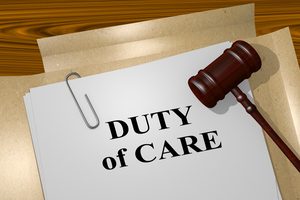Duty of care is critical for nonprofit board directors
Guest post by Colette Collier Trohan. Directors of nonprofit boards will find this outline of their duty of care an invaluable guide.

© Can Stock Photo/Medclips
Do you remember being a teenager and ignoring the potential consequences of your actions? Did anyone ever look at you and ask: “What were you thinking?!!!” You weren’t expected to be a perfect child, but you were being asked to take a reasonable amount of care to make good decisions. In a way, that’s what boards do with the duty of care.
No checklist for duty of care
With the legal duty of care, boards are expected to make decisions based on reasonable circumstances, in keeping with what a normal and prudent person might do in similar circumstances. There’s no checklist for duty of care, but boards are expected to exercise common sense and good judgment. Unfortunately, as some boards have found, the situation is judged in hindsight – usually after the damage is done.
How can we exercise duty of care?
What are some of the ways we can be sure we are exercising duty of care? One of the best ways is to make sure that you know exactly what you are voting on – every time a vote is taken. Stop letting the chair ask if everyone agrees without stating exactly what is being agreed on. Every vote is a yes or no question – don’t take risky or meaningless vote. Perhaps it might make the meetings take a few minutes longer, but that’s part of the duty of care.
What about reports and duty of care?
Don’t vote to “accept” reports – it means the same as if the board adopted the whole report: that it agrees with every word. The riskiest – and all too common vote – is one to accept unaudited financial statements. Why have an audit if the board is going to sanction interim reports? Just because something is put before the board doesn’t mean they have to do anything with it. Some things are for information only, and the minutes need only state the report was presented and discussed .
Follow this process for motions
Put all motions on the LCD projector, and don’t vote until the issue is clearly stated. This will create the first draft of the minutes, because the motion will be voted on exactly as it was written. The LCD projector is a way to exercise the duty of care and ensure that everyone always knows what’s going on, and it will make amendments far easier to handle. After all, amendments are simply directions to change words, so projecting instructions on language changes actually puts amendments into their proper form. Use a word processing program rather than a slide presentation to make editing easier; just be sure to use a san serif font and a large size.
Reading board packet is critical for duty of care
Directors must make sure they have read the entire board packet. If there’s too much content (and that’s a temptation with electronic board books) have it pared down to an executive summary. It is reasonable to expect that, if the packet contains certain information, the directors are aware of that information and are using it to make decisions. There must be enough time to read and absorb the information and – most importantly – it must not change once it’s distributed. If the issue isn’t ready a week or ten days before the board meeting, it’s too late. A temptation with electronic board book software is that it can be changed – but how does a director know exactly what changed? If a conscientious director reads the packet right away, how many times must he go back over things because they’ve been “updated”?
Consider all viewpoints to exercise duty of care
At the meeting, be sure to have a full discussion of all points of view. Make sure everyone has equal access to the floor and, as much as possible, alternate points of view so the board has a balanced discussion. Encourage healthy discourse. Although the board ultimately speaks with one voice, that’s after the vote has been taken and the decision made. Prior to that, every viewpoint must be considered.
The ultimate question re duty of care
Ultimately, picture yourself standing in front of a judge. What will your answer be if she asks, “What were you thinking?” The quality of your answer to that question might be the best gauge of your duty of care.

Read “Avoiding action in Robert’s Rules” for another informative post by our guest author.

